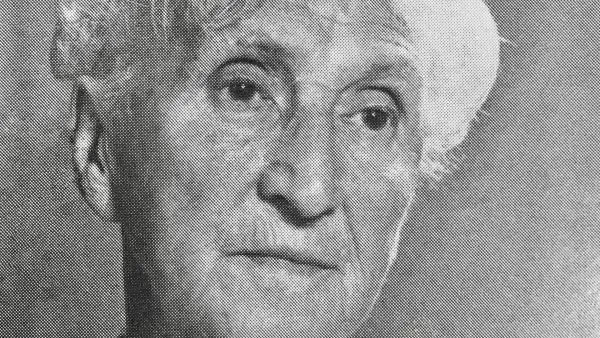People need roots – exploring the legacy of Irene Barclay
Posted on: 31 July, 2024

For the latest Be Part of the Change feature, we explored the history and legacy of Irene Barclay, the first woman to qualify as a Chartered Surveyor.

Earlier this year, a blue plaque was added to the outside of 1A St. Martin’s House, Polygon Road, London.
The plaque, located in the busy inner-city district of Somers Town, was commissioned by English Heritage, a charity that manages historic sites across England. It reads the following:
English Heritage
Irene Barclay 1894-1989
Housing reformer and Britain’s first qualified woman surveyor worked here 1964 – 1972.
This plaque is intended to commemorate Irene Barclay, the first woman to qualify as an RICS professional and an alumni of UCEM.
In this instalment of our Be Part of the Change we’ll discuss the history of Irene, from how she first entered the built environment, to her trailblazing work in social reform and the incredible legacy she has left behind, both for UCEM and for the sector as a whole.
An upbringing
Irene was born Irene Martin in Hereford on 27 May 1894, the eldest of four children. Her father, Basil, was a socialist and a non-conformist minster, who was himself actively involved in social work. Basil’s dedication and principles often meant the family had difficulties financially, but it informed Irene’s upbringing and imbued a sense of social responsibility that marked her later career.
In her early years, Irene’s religious and political upbringing meant she often felt like an outsider. This changed when her family moved to North London, where more people shared her beliefs. Both her and her siblings all obtained university standard education, something which was unusual at the time. Her brother, Kingsley, became an editor for the New Statesman, and was a committed pacifist and conscientious objector.
Irene obtained a first-class degree in History from Bedford College, or as it was then known, Bedford College for Women. She followed this up by completing a Diploma in Social Science. However, it was through work experience during her diploma and exposure to London’s slums that she became drawn to a career in housing and the built environment.
The first female Chartered Surveyor
In 1919, the Sexual Disqualification Act Removal was passed, which allowed women to enter various professions, such as law, accounting and, of course, surveying – all of which had previously been prohibited to them.
Irene, who was then working at the Crown Office and a member of the Association of Women House Property Managers, took the opportunity to take a two-year course with UCEM (then the College of Estate Management), where she studied Land Agency, Valuations and Building Surveying. This culminated in her becoming the first female Chartered Surveyor with the Royal Institution of Chartered Surveyors (RICS).
Irene was succeeded by Evelyn Perry, the second woman to qualify as a Chartered Surveyor, and the two came together to form a surveying practice, Barclay and Perry. Irene had at this point married John Barclay, and later had two sons, born in 1926 and 1929.
A career in surveying linked to social reform
Irene’s upbringing, along with her background in social science, meant she brought a new perspective to the male-dominated profession of surveying.
She completed surveys for local boroughs across London and parts of Manchester and Birmingham, and her work often considered the people inside the buildings as well as the buildings themselves. It’s noted that she actually went inside buildings during surveys, something which wasn’t common practice at the time.
Her career was an outward facing one – she wrote and spoke extensively about surveying as a career and housing issues. She sought to influence through public bodies, advocating that housing must have support and that designs needed to move beyond the utilitarian to consider the lives of the people within them. Her work in property was inextricably linked to her social ethos, and she provided a holistic perspective to the profession, not seeing streets as separated but rather together as communities.
While Irene wasn’t herself the sole driver of these social reforms, her influence on social issues, housing in the country and the diversity of the built environment is clear. She was described as ‘a patron of the poor’ and was awarded an OBE for her work in social reform. Her book, People Need Roots: The Story of the St. Pancras Housing Association, documented the challenges of social housing and echoes her philosophy.
The legacy of Irene Barclay
 In an obituary for The Guardian after her death in 1989, Irene was described as ‘one of the most influential social reformers of the 20th century’. The blue plaque, commissioned by English Heritage earlier this year, sits above her old office from 1964 to 1972, when she acted as Estates Manager and Honorary Secretary of the St Pancras House Improvement Society.
In an obituary for The Guardian after her death in 1989, Irene was described as ‘one of the most influential social reformers of the 20th century’. The blue plaque, commissioned by English Heritage earlier this year, sits above her old office from 1964 to 1972, when she acted as Estates Manager and Honorary Secretary of the St Pancras House Improvement Society.
Irene’s legacy also lives on at UCEM. She was remembered on International Women’s Day as part of the institution’s centenary celebrations in 2019, on a piece which stated:
‘Irene was a pioneer for the profession and we are delighted to have played a part in her decorated career, and life.’
As Jane E Fawkes, Deputy Vice Chancellor and University Secretary at UCEM commented on the unveiling of the plaque:
“UCEM’s heritage is one of the things I’m most proud of. Many people at UCEM feel as though we’re walking in the shoes of the people who have come before us.
“To this day, there’s still a real issue with women and diversity in our sector. The fact that, back then, we were so pioneering in making our offering welcoming to women… it’s fantastic, and a story that needs to be told.
“UCEM was set up by a Royal Charter to provide education and training to the property, land and construction sectors in the built environment – it’s the only institution that was established to do that. From Irene and the women that have since followed her, to the education we provided to the Women’s Land Army, we’ve built up such a solid and respected reputation over the years to enable people to have equal access to fulfilling careers.
“Stories like Irene’s are something we can be really proud of.”

Find out more about the Be Part of the Change and get involved. If you’d like to get in touch with our Student Ambassadors for EDI, email outreachandinclusion@ucem.ac.uk





